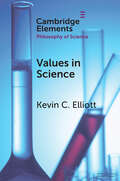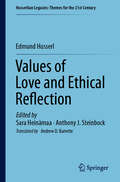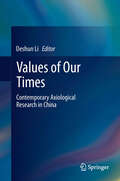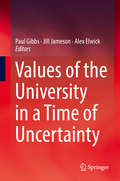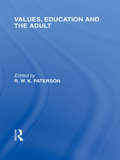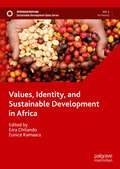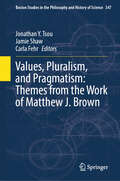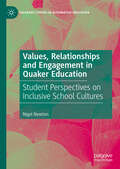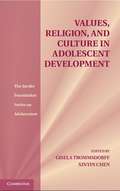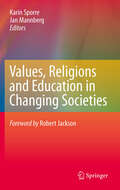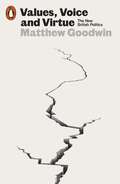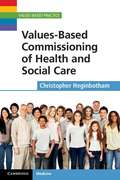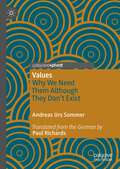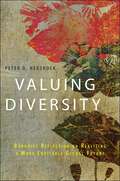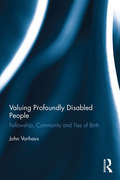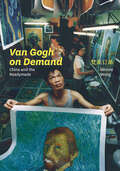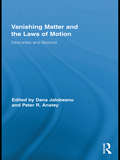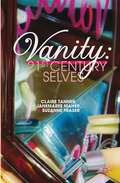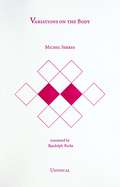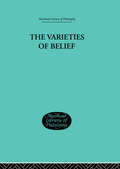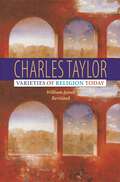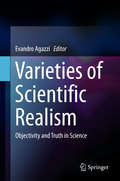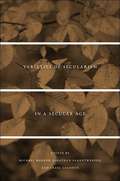- Table View
- List View
Values in Science (Elements in the Philosophy of Science)
by Kevin C. ElliottThis Element introduces the philosophical literature on values in science by examining four questions: (1) How do values influence science? (2) Should we actively incorporate values in science? (3) How can we manage values in science responsibly? (4) What are some next steps for those who want to help promote responsible roles for values in science? It explores arguments for and against the “value-free ideal” for science (i.e., the notion that values should be excluded from scientific reasoning) and concludes that it should be rejected. Nonetheless, this does not mean that value influences are always acceptable. The Element explores a range of strategies for distinguishing between appropriate and inappropriate value influences. It concludes by proposing an approach for managing values in science that relies on justifying, prioritising, and implementing norms for scientific research practices and institutions.
Values of Love and Ethical Reflection (Husserlian Legacies: Themes for the 21st Century)
by Edmund HusserlThis first volume of Husserlian Legacies: Themes for the 21st Century focuses on hitherto underexamined dimensions of Husserl’s philosophical thinking and in particular, values and love. Texts in this series draw from the variety of Husserl’s rich original works; they are selected and arranged with the support of the Husserl Archives, Leuven. The texts are made available in English and are primarily targeted to advanced undergraduates, graduate students, and scholars. This volume helps the reader both to investigate the themes of value and love and to gauge their role in Husserl’s reflections on related topics: his analysis of philosophy, the sciences as vocational tasks, the emotions and the community of love, as well as his personalistic reformulation of the categorical imperative. The texts gathered, edited, and translated in this volume have far-reaching implications, ranging from axiology and individual and social ethics to the philosophy of emotions, action theory, and the philosophy of science.
Values of Our Times
by Deshun LiPhilosophers have gradually accepted axiology as one branch of philosophy. As a basic category belonging to axiology and philosophy, "value" is the general abstraction of concrete value formation in various fields including utility, ethics and appreciation of the beauty. The problem of value is essentially a problem of historical activities of practice in human society. The axiology based on the scientific practice view insists on the principle of unification between theory and practice, truth and value. In research of axiology, the relation between subjectivity and objectivity of values is a problem that must be solved in the first place. The modern conversation of value philosophy is the academic and practical demands of the value philosophy research in China. Value evaluation is an important part of the axiology. In order to deepen the research of value philosophy and to promote the development of current value philosophy, we must have scientific mode of thinking suitable for the nature of value. It is the base of value relation, the origin of value needs, the process of value creation and actualization and the fundamental way to proving ones value as a human being.
Values of the University in a Time of Uncertainty
by Paul Gibbs Jill Jameson Alex ElwickThis deliberately wide-ranging book addresses issues related to trust, compassion, well-being, grace, dignity and integrity. It explores these within the context of higher education, giving existential and empirical accounts of how these moral duties can be expressed within the academy and why they ought to be. The chapters range from values used in the marketing and management of institutions to their realisation in therapeutic and teacher training spaces. The book opens with a specific introduction which positions the work and outlines the context of duties and obligations at play. This is followed by two distinct but related sections including chapters on theoretical issues, organisational practices and personal praxis. The first part is more abstract and theoretical, the second locates the values discussed within the practices of the university. In doing so the book encompasses a wide range of issues from multi-disciplinary and geo-political regions. The authors are a mixture of world-leading authorities on values in higher education and earlier career researchers, who are nonetheless equally passionate contributors. This mix gives the book vibrancy and offers insight which appeals to both an academic and managerial readership.
Values, Education and the Adult (International Library of the Philosophy of Education Volume 16)
by R.W.K. PatersonIn this study of the main conceptual and normative issues to which the education of the adult gives rise, the author demonstrates that these issues can be understood and resolved only by coming to grips with some of the central and most contentious questions in epistemology, philosophy of mind, ethics, and social philosophy. A salient feature of the book is its searching examination of the different types of value judgement by which all educational discourse is permeated. The analysis of the nature and justification of educational judgements forms the basis of an overall philosophy of adult education which should provide a much needed axiological framework for the guidance of practitioners in this growing area of educational concern.
Values, Identity, and Sustainable Development in Africa (Sustainable Development Goals Series)
by Ezra Chitando Eunice KamaaraThis book contends that Africa’s sustainable development must be built on African identity and values. Contributors reflect of the role of values in Africa’s effort to overcome poverty, the focus of SDG 1. The volume reflects on how indigenous values such as Ubuntu constitute a critical resource in addressing poverty. It reiterates the importance of positioning the response to poverty in Africa on the continent’s own, home grown values. Contributors also interrogate how values such as integrity, hard work, tolerance, solidarity, respect and others serve to position Africa strategically to overcome poverty. The volume focuses on how values can help Africa to overcome challenges such as corruption, violence, intolerance, competitive ethnicity, xenophobia, misplaced priorities and others. It provides fresh and critical reflections on the role of values and identity in anchoring Africa’s development in the light of SDG 1.
Values, Pluralism, and Pragmatism: Themes from the Work of Matthew J. Brown (Boston Studies in the Philosophy and History of Science #347)
by Jamie Shaw Jonathan Y. Tsou Carla FehrThis book offers eighteen original historical and philosophical essays focused on values in science, scientific pluralism, and pragmatism. These themes have been central in the work of Matthew J. Brown, and the book frames these topics through an engagement with Brown's broadly ranging work on values in science. The themes of this book are integrated and unified in the pragmatic and value-laden ideal of science defended by Professor Brown in his fascinating 2020 book, Science and Moral Imagination. Brown's ideal of moral imagination prescribes that scientists should recognize the contingencies in their work as unforced choices, examine morally salient aspects of these decisions, recognize the various interests of relevant stakeholders, explore and construct alternative options, and exercise fair and warranted value judgments to guide those decisions. The interdisciplinary essays in this volume engage with different aspects of Brown's philosophical research on scientific values as well as his historical research on figures such as John Dewey and Paul K. Feyerabend. With a fresh focus on topics such as moral imagination, inductive risk, and epistemic priority in various socially salient contexts (e.g., artificial intelligence, psychiatry, segregation research), this book is of great interest to a broad audience of researchers working in philosophy of science, philosophy of medicine, history and philosophy of science, and science and technology studies.
Values, Relationships and Engagement in Quaker Education: Student Perspectives on Inclusive School Cultures (Palgrave Studies in Alternative Education)
by Nigel NewtonThis book provides a unique critical perspective on the importance of values to school culture. Drawing on research in Quaker schools in England, and the perspectives of students, it challenges the idea that school evaluation should be primarily based on measurable outcomes and argues that values matter more to learning than is often acknowledged. Furthermore, the book provides important insights on how to research schools that claim to hold similar values, from multi-academy chains to other so-called faith schools. Throughout the text, the author underscores the importance of values to students’ dispositions, in order to engage with the learning opportunities their schools provide. He argues for seeing schools as places where equality, inclusiveness and mutual respect should be central, not only to help students understand our fragile, multicultural democracy, but also because these values open up the possibility of learners’ increased engagement with curriculum knowledge.
Values, Religion, and Culture in Adolescent Development
by Xinyin Chen Gisela TrommsdorffCultural values and religious beliefs play a substantial role in adolescent development. Developmental scientists have shown increasing interest in how culture and religion are involved in the processes through which adolescents adapt to environments. This volume constitutes a timely and unique addition to the literature on human development from a cultural-contextual perspective. Editors Gisela Trommsdorff and Xinyin Chen present systematic and in-depth discussions of theoretical perspectives, landmark studies, and strategies for further research in the field. The eminent contributors reflect diverse cultural perspectives, transcending the Western emphasis of many previous works. This volume will be of interest to scholars and professionals interested in basic developmental processes, adolescent social psychology, and the sociological and psychological dimensions of religion.
Values, Religions and Education in Changing Societies
by Karin Sporre Jan MannbergEducation is a societal matter and takes place in relation to societal changes. Today, in many countries, it has to grapple with diversity and differences brought about by migration and changes in gender relations. Questions of values, human rights and the role of religions are raised. In this book scholars from Sweden, Norway, Germany, Great Britain, Canada, Namibia and South Africa discuss the issues above. Similarities as well as differences are highlighted. The varied contributors engage in a North-South dialogue. Among the questions addressed are: Can the Scandinavian countries be understood as more religious than their up-to-date, seemingly secularist reputation has led us to believe? How do some European, Muslim, Christian and secular pupils understand the religious education they receive? Could a global citizenship education, with a gendered understanding as an integral part, be accomplished? 'Diversity' and 'social justice': what does it take to theoretically integrate these two crucial parameters in education, in South Africa, and in Sweden? The role of religious and values education under changing circumstances is explored through the diverse contributions, that also challenge the hegemony of a Western understanding of democracy, among other values. The purpose of this is to assess what could now constitute global educational common ground.
Values, Voice and Virtue: The New British Politics
by Matthew Goodwin*THE SUNDAY TIMES BESTSELLER**A Financial Times 2023 book to watch*'Forceful ... The fundamental thrust of Goodwin's argument is right ... a new centre ground of British politics is being formed - even if both parties have yet to fully comprehend it' The TimesWhat has caused the recent seismic changes in British politics, including Brexit and a series of populist revolts against the elite? Why did so many people want to overturn the status quo? Where have the Left gone wrong? And what deeper trends are driving these changes?British politics is coming apart. A country once known for its stability has recently experienced a series of shocking upheavals. Matthew Goodwin, acclaimed political scientist and co-author of National Populism, shows that the reason is not economic hardship, personalities or dark money. It is a far wider political realignment that will be with us for years to come. An increasingly liberalised, globalised ruling class has lost touch with millions, who found their values ignored, their voices unheard and their virtue denied. Now, this new alliance of voters is set to determine Britain's fate.Sunday Times bestseller, April 2023
Values-Based Commissioning of Health and Social Care
by Christopher Heginbotham ObeHealth and social care commissioning is a values-driven as well as evidence-driven enterprise. However, whereas there has been an expectation that the evidence-base of commissioning should be made fully explicit, the corresponding values-base has been left largely implicit. The book addresses this subject through a detailed discussion of values and values-based practice, illustrated with case examples, and by developing a critique of existing commissioning. This approach enables commissioners to identify and make explicit the often diverse values of all those involved, whether as commissioners, providers or users of services. It provides a skills base and other support processes for working with differences in values held by all those engaged in making commissioning decisions. This will be essential reading for doctors, both experienced and in training, commissioning managers, professional staff in NHS Foundation Trusts and the private sector and all 'at the sharp' end of practice.
Values: Why We Need Them Although They Don’t Exist
by Andreas Urs SommerIn his book, Andreas Urs Sommer reflects on the question of what it really means when everybody’s appealing to values, all the time – the question, fundamentally, of what values actually are. Values explores both of these points, arriving at two intriguing suggestions: Maybe what we call values are just a set of elaborate fictions. And maybe those fictions serve some very important purposes.
Valuing Diversity: Buddhist Reflection on Realizing a More Equitable Global Future
by Peter D. HershockDiversity matters. Whether in the context of ecosystems, education, the workplace, or politics, diversity is now recognized as a fact and as something to be positively affirmed. But what is the value of diversity? What explains its increasing significance? Valuing Diversity is a groundbreaking response to these questions and to the contemporary global dynamics that make them so salient.Peter D. Hershock examines the changes of the last century to show how the successes of Western-style modernity and industrially-powered markets have, ironically, coupled progressive integration and interdependence with the proliferation of political, economic, social, cultural, and environmental differences. Global predicaments like climate change and persistent wealth inequalities compel recognition that we are in the midst of an era-defining shift from the primacy of the technical to that of the ethical. Yet, neither modern liberalism nor its postmodern critiques have offered the resources needed to address such challenges.Making use of Buddhist and ecological insights, Valuing Diversity develops a qualitatively rich conception of diversity as an emerging value and global relational commons, forwarding an ethics of interdependence and responsive virtuosity that opens prospects for a paradigm shift in our pursuits of equity, freedom, and democratic justice.
Valuing Profoundly Disabled People: Fellowship, Community and Ties of Birth (Routledge Research in Special Educational Needs)
by John VorhausGrowing numbers of human beings live with profound and multiple learning difficulties and disabilities. Exploring the moral, social and political implications of this trend, Valuing Profoundly Disabled People addresses questions that are high on policy and practice agendas in numerous regions around the world, including the UK and the EU, the USA, and Australasia. In this important work Vorhaus examines fundamental moral and social questions about profound disability, and each chapter combines a comprehensive review of existing literature with thought-provoking and original philosophical arguments. Vorhaus argues that there is a pressing need to consider the moral and political claims of people whose lives are characterised by extensive impairments, dependency and vulnerability. The book prompts readers to reflect on complex issues relating to the practices of caring, teaching and treating people with profound disabilities in contexts such as education, health care and social policy. Providing a much-needed contribution to the field, this book will be of interest to postgraduates, academics and researchers in a number of distinct and interrelated fields, including disability and impairment, human rights, philosophy, sociology, health and social policy, and education. The book will also be of great interest to practitioners and policymakers seeking to promote the aims of realising human potential and respecting disability.
Van Gogh on Demand: China and the Readymade
by Winnie Won Yin WongIn a manufacturing metropolis in south China lies Dafen, an urban village that famously houses thousands of workers who paint van Goghs, Da Vincis, Warhols, and other Western masterpieces for the world market, producing an astonishing five million paintings a year. To write about work and life in Dafen, Winnie Wong infiltrated this world, first investigating the work of conceptual artists who made projects there; then working as a dealer; apprenticing as a painter; surveying wholesalers and retailers in Europe, East Asia and North America; establishing relationships with local leaders; and organizing a conceptual art exhibition for the Shanghai World Expo. The result is Van Gogh on Demand, a fascinating book about a little-known aspect of the global art world--one that sheds surprising light on the workings of art, artists, and individual genius. Confronting big questions about the definition of art, the ownership of an image, and the meaning of originality and imitation, Wong describes an art world in which idealistic migrant workers, lofty propaganda makers, savvy dealers, and international artists make up a global supply chain of art and creativity. She examines how Berlin-based conceptual artist Christian Jankowski, who collaborated with Dafen's painters to reimagine the Dafen Art Museum, unwittingly appropriated the work of a Hong Kong-based photographer Michael Wolf. She recounts how Liu Ding, a Beijing-based conceptual artist, asked Dafen "assembly-line" painters to perform at the Guangzhou Triennial, neatly styling himself into a Dafen boss. Taking the Shenzhen-based photojournalist Yu Haibo's award-winning photograph from the Amsterdam's World Press Photo organization, she finds and meets the Dafen painter pictured in it and traces his paintings back to an unlikely place in Amsterdam. Through such cases, Wong shows how Dafen's painters force us to reexamine our preconceptions about creativity, and the role of Chinese workers in redefining global art. Providing a valuable account of art practices in an ascendant China, Van Gogh on Demand is a rich and detailed look at the implications of a world that can offer countless copies of everything that has ever been called "art. "
Vanishing Matter and the Laws of Motion: Descartes and Beyond (Routledge Studies in Seventeenth-Century Philosophy)
by Dana JalobeanuThis volume explores the themes of vanishing matter, matter and the laws of nature, the qualities of matter, and the diversity of the debates about matter in the early modern period. Chapters are unified by a number of interlocking themes which together enable some of the broader contours of the philosophy of matter to be charted in new ways. Part I concerns Cartesian Matter; Part II covers Matter, Mechanism and Medicine; Part III covers Matter and the Laws of Motion; and Part IV covers Leibniz and Hume. Bringing together some of the world’s leading scholars of early modern philosophy, as well as some exciting new researchers, Vanishing Matter and the Laws of Motion stakes out new territory that all serious scholars of early modern philosophy and science will want to traverse.
Vanishing into Things: Knowledge in Chinese Tradition
by Barry AllenVanishing into Things explores the concept of knowledge in Chinese thought over two millennia, from Confucius to Wang Yangming (ca. 1500 CE), and compares the different philosophical imperatives that have driven Chinese and Western thought. Challenging the hyperspecialized epistemology of modern philosophy in the West, Barry Allen urges his readers toward an ethical appreciation of why knowledge is worth pursuing.<P><P>Western philosophers have long maintained that true knowledge is the best knowledge. Chinese thinkers, by contrast, have emphasized not the essence of knowing but the purpose. Ideas of truth play no part in their understanding of what the best knowledge is: knowledge is not deduced from principles or reducible to a theory. Rather, in Chinese tradition knowledge is expressed through wu wei, literally “not doing”―a response to circumstances that is at once effortless and effective. This type of knowledge perceives the evolution of circumstances from an early point, when its course can still be changed, provided one has the wisdom to grasp the opportunity.
Vanity: 21st Century Selves
by Suzanne Fraser Claire Tanner Janemaree MaherWhat role does 'vanity' play in the lives of 21st century subjects? Exploring a range of fields including public health, information technology, media studies and feminist approaches to the body and beauty, this book offers a broad analysis of how 'vanity' shapes contemporary Western societies and its understandings of selfhood.
Variations on the Body (Univocal)
by Michel SerresWorld-renowned philosopher, Michel Serres writes a text in praise of the body and movement, in praise of teachers of physical education, coaches, mountain guides, athletes, dancers, mimes, clowns, artisans, and artists. This work describes the variations, the admirable metamorphoses that the body can accomplish. While animals lack such a variety of gestures, postures, and movements, the fluidity of the human body mimics the leisure of living beings and things; what&’s more, it creates signs. Already here, within its movements and metamorphoses, the mind is born. The five senses are not the only source of knowledge: it emerges, in large part, from the imitations the plasticity of the body allows. In it, with it, by it knowledge begins.
Varieties of Belief (Muirhead Library Of Philosophy Ser.)
by Paul HelmFirst published in 2002. This is Volume IV of seven in the Library of Philosophy series on the Philosophy of Religion. The Library of Philosophy was designed as a contribution to the History of Modern Philosophy under the heads: first of Different schools of Thought - Sensationalist, Realist, Idealist, Intuitivist; secondly of different Subjects - Psychology, Ethics, Aesthetics, Political Philosophy, Theology. Written in 1973, work in the philosophy of religion in the last thirty years has focused increasingly on the language of religion. Too often it seems that unless one happens to share the particular religious outlook of the writer, religious or theological premises are being made to yield philosophical conclusions. There is an obvious need for a less question-begging procedure, one that separates the philosophy from the religion. The aim of the study is to make a point about philosophical methodology no grounds are offered for preferring one analysis of religious belief to another.
Varieties of Moral Personality: Ethics and Psychological Realism
by Owen FlanaganOwen Flanagan argues in this book for a more psychologically realistic ethical reflection and spells out the ways in which psychology can enrich moral philosophy. Beginning with a discussion of such “moral saints” as Gandhi, Mother Teresa, and Oskar Schindler, Flanagan charts a middle course between an ethics that is too realistic and socially parochial and one that is too idealistic, giving no weight to our natures.
Varieties of Religion Today: William James Revisited (Institute for Human Sciences Vienna lecture series)
by Charles Taylor“Varieties of Religion Today is a provocative, witty, and worthy conversation with James’s timeless work.” —Publishers WeeklyA hundred years after William James delivered the celebrated lectures that became The Varieties of Religious Experience, one of the foremost thinkers in the English-speaking world returns to the questions posed in James’s masterpiece to clarify the circumstances and conditions of religion in our day. An elegant mix of the philosophy and sociology of religion, Charles Taylor’s powerful book maintains a clear perspective on James’s work in its historical and cultural contexts, while casting a new and revealing light upon the present.Lucid, readable, and dense with ideas that promise to transform current debates about religion and secularism, Varieties of Religion Today is much more than a revisiting of James’s classic. Rather, it places James’s analysis of religious experience and the dilemmas of doubt and belief in an unfamiliar but illuminating context, namely the social horizon in which questions of religion come to be presented to individuals in the first place.Taylor begins with questions about the way in which James conceives his subject, and shows how these questions arise out of different ways of understanding religion that confronted one another in James’s time and continue to do so today. Evaluating James’s treatment of the ethics of belief, he goes on to develop an innovative and provocative reading of the public and cultural conditions in which questions of belief or unbelief are perceived to be individual questions. What emerges is a remarkable and penetrating view of the relation between religion and social order and, ultimately, of what “religion” means.
Varieties of Scientific Realism
by Evandro AgazziThis book offers a comprehensive update on the scientific realism debate, enabling readers to gain a novel appreciation of the role of objectivity and truth in science and to understand fully the various ways in which antirealist conceptions have been subjected to challenge over recent decades. Authoritative representatives of different philosophical traditions explain their perspectives on the meaning and validity of scientific realism and describe the strategies being adopted to counter persisting antirealist positions. The coverage extends beyond the usual discussion of realism within the context of the natural sciences, and especially physics, to encompass also its applicability in mathematics, logic, and the human sciences. The book will appeal to all with an interest in the recent realist epistemologies of science, the nature of current philosophical debate, and the ongoing rehabilitation of truth as the legitimate goal of scientific research.
Varieties of Secularism in a Secular Age
by Craig Calhoun Jonathan Vanantwerpen Michael WarnerIn the book a prominent and varied group of scholars chart the conversations in which a secular age intervenes and address wider questions of secularism and secularity.
